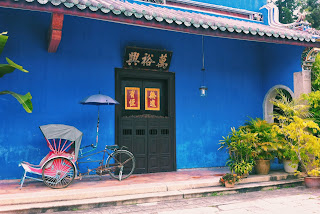And this where I start to make less sense than ever:
I am as cliché as the rest of the tourists of the world, even when I end up being the only white girl (it's what I've been called here a few times) in an all chinese court food eating laksa or ask for an amazing roti in an all indian restaurant (for lack of a better name), I'm that white tourist that hides from the obviously touristy places and tries to transform it in Travel, with a capital T. I'm the one that still has all those romantic notions of traveling, so I'm still as cliché as the next person.
I've been fascinated with Georgetown ever since some friends mentioned that the actual house where Indochine was filmed in a house there; one of those fascinations that owe much to a dreamy adolescence, when I thought everything I saw or read was special somehow (despite my slightly actual anarchic tendencies, I actually loved discovering and being able to access culture at that age, I'm quite fortunate about that).
Indochine was one of those love stories that I actually liked, and it might actually tell you a lot about my taste on those and how happy endings aren't usually my thing. Mind, I've never been much of a fan of love stories to begin with (Jane Austen not included) but we all learn from somewhere.
The house in question, the one that overlooked the fields of rubber that Deneuve's character took care of was actually the house of a very rich chinese merchant named Cheong Fatt Tze. It was one of a lot of houses that he constructed around his world, his favorite for sure if it was were his 8 wives lived. It's been nicknamed The Blue Mansion, because after the family descendants left it and decided to rent the rooms, nobody took care of its maintenance and the paint faded with the sea air or who knows why but it started to turn blue (someone might, not me that's for sure). People from Penang recognized it for his blue outside tint, that's why it's still blue now.
Of course I went.
While visiting it, the guide mentioned that the traditional chinese courtyard should include the 5 elements (air, wood, fire, metal, water) to bring good fortune, and she suddenly made the ci qong form of water with her hands when she started to explain the engineering of it: how after the collection of rain water in the courtyard, it enters and moves easily within the house, but it drains slowly. Water is fortune, money, prosperity so it makes sense that it enters quickly but leaves the house slowly.
My hands slowly made the form too, almost by reflex.
I've been thinking a lot about water ever since I went to the Cameron Highlands, at last more consciously. About how it can permeate everything and be so dangerous, but at the same time if you can reach some balance it's good. In the end what I've also realized is that the three things I think about more often include water in some way or another: bottles of drinking water, a shower and having my clothes clean (and dry). Things that I used to get really easily, but that now I appreciate so much more.
Water is change and danger, the abysm against too much ambition, but if it reaches an understanding with your own heart through sincerity and truthfulness is the way of learning and winning (says the I Ching).
But water are also feelings, and I have to say that I feel open and excited and quiet in ways I've never felt. Hopeful might be the best word.




































